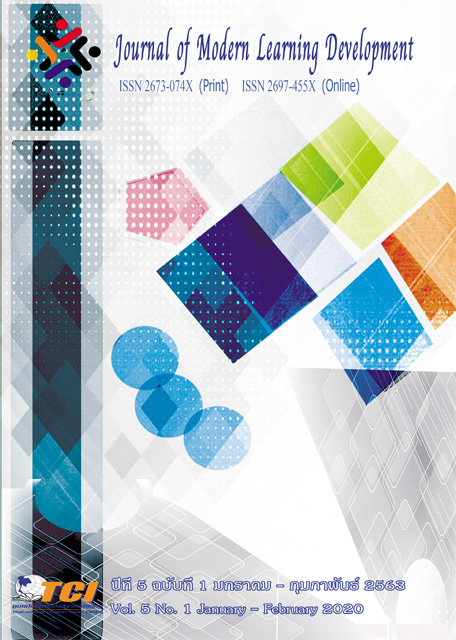Strategy of Potential Development for Community leaders in Model Sufficiency Economy Village
Main Article Content
Abstract
The purpose of this research is 1) to study the potential of the community leaders in the model sufficiency economy Village in Khon Kaen Province 2) to develop the potential of the community leaders in the model sufficiency economy Village in Khon Kaen province and 3) to determine the strategy of the potential development for community leaders in the model sufficiency economy Village in Khon Kaen Province. It is a participatory action research. The key informant group is the target group in the research area in all 4 communities by using the tools to collect the research data: 1) Interview form 2) Group discussion questions 3) Observation forms, both participatory and non-participatory and 4) Workshop seminars.
The results of the research found that:
1.The potential of Leaders of all 4 communities found that there are strong community leaders by having similar features, high leadership potential, good communication potential (Art Word) and management potential in the community. The point that should be developed Community leaders should create more good interaction with people by widening your attitude. They should listen and accept the negative echoes for oneself and then take to develop and improve recruit as many participants as possible and should study more in many areas, especially in modern technology in order to be self-immune and keeping up with global changes in the 21st century.
2.Potential development for Community leaders according to The KAS Model is knowledge, attitude and skill by going on a field trip and training for a good community leadership course at Ban Samrong, Tha Sawang Sub-district, Mueang District, Surin Province, resulting in the development of administrative knowledge. The use of morals Principles of participation and guidelines for project development in the area Create a positive attitude until being able to apply the knowledge gained to develop their own communities.
3.The strategy of the potential development for community leaders in the model sufficiency economy Village shown that There should be a strategy to develop the potential of community leaders in 3 areas: AKL Model by consisting of the attitude development strategy (A- Attitudes), Knowledge (K-Knowledge), and leadership skills (L-Leadership Skills) and constantly being dynamic Which has another 4 main as a driver to develop the potential of oneself and the community, PANM Model consisting of 1) Be careful to stop problems and obstacles to the development of their potential and the community that has not yet occurred (P-Precaution 2) Regularly reduce, reduce, or stop what is an obstacle to the development of one's own potential and the community that has occurred (A-Abandon) 3) Regularly develop the potential of oneself and the unborn community to occur and create new things to happen (N-New Development) and 4) Maintaining the potential of oneself and the community which have already occurred to be stable and sustainable (M-Maintain). In this research, the conclusions can be obtained from the method of synthesis as follows KAS+AMPP = AKL Model - PANM Model.
Article Details
References
ปรีชา วุฒิการณ์ และคณะ. (2548). การสร้างตัวชี้วัดคุณลักษณะผู้นำในการบริหารจัดการชุมชนเข้มแข็ง. รายงานการวิจัย: มหาวิทยาลัยธุรกิจบัณฑิตย์.
พระครูภาวนาโพธิคุณ (สมชาย กนฺตสีโล) และคณะ. (2562). การพัฒนาพฤติกรรมเชิงจริยธรรมของเยาวชนท่ามกลางความเปลี่ยนแปลงทางเทคโนโลยี : กรณีศึกษาเยาวชนไทยในจังหวัดขอนแก่น. วารสารบัณฑิตศึกษามหาจุฬาขอนแก่น., 6 (4), 701-715.
พระมหาเทวประภาส วชิรญาณเมธี (มากคล้าย). (2559). พุทธบูรณาการเพื่อการพัฒนาสมรรถนะองค์การบริหารส่วนตำบลในการเสริมสร้างชุมชนเข้มแข็ง. พุทธศาสตรดุษฎีบัณฑิต สาขาวิชารัฐประศาสนศาสตร์. บัณฑิตวิทยาลัย: มหาวิทยาลัยมหาจุฬาลงกรณราชวิทยาลัย.
เรมวล นันท์ศุภวัฒน์. (2542). ภาวะผู้นำทางการพยาบาลในองค์การ. ภาควิชาบริหารการพยาบาล คณะพยาบาลศาสตร์: มหาวิทยาลัยเชียงใหม่.
วิภาดา คุปตานนท์. (2544). การจัดการและพฤติกรรมองค์การ. กรุงเทพมหานคร: สำนักพิมพ์มหาวิทยาลัยรังสิต.
สุกัญญา รัศมีธรรมโชติ. (2549). แนวทางการพัฒนาศักยภาพมนุษย์ด้วย Competency.กรุงเทพมหานคร: สถาบันเพิ่มผลผลิตแห่งชาติ.
สุทธญาณ์ โอบอ้อม. (2557). การพัฒนาศักยภาพบุคลากรขององค์กรปกครองส่วนท้องถิ่นตามแนวพระพุทธศาสนา. พุทธศาสตรดุษฎีบัณฑิต สาขาวิชารัฐประศาสนศาสตร์. บัณฑิตวิทยาลัย: มหาวิทยาลัยมหาจุฬาลงกรณราชวิทยาลัย.
สำนักงานคณะกรรมการพัฒนาการเศรษฐกิจและสังคมแห่งชาติ. (2558). สรุปสาระสำคัญแผนพัฒนาเศรษฐกิจและสังคมแห่งชาติ ฉบับที่ 12 พ.ศ. 2560-2564. กรุงเทพมหานคร: สำนักนายกรัฐมนตรี.


